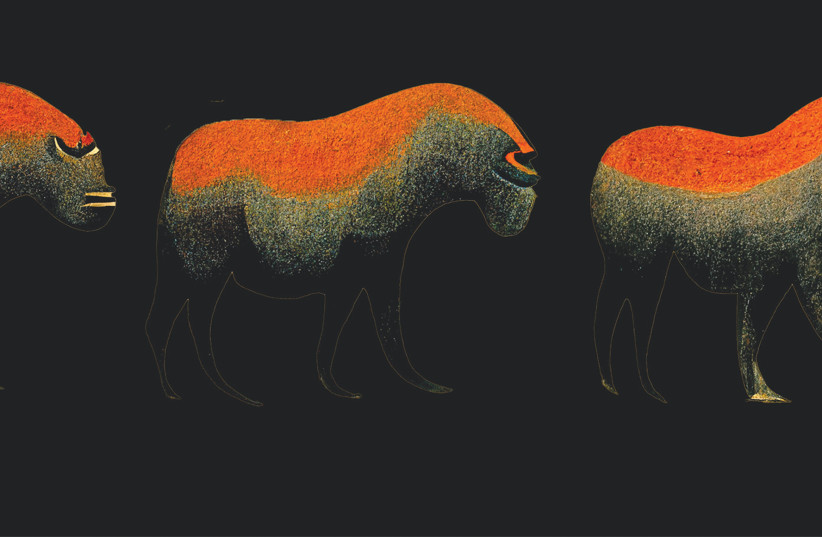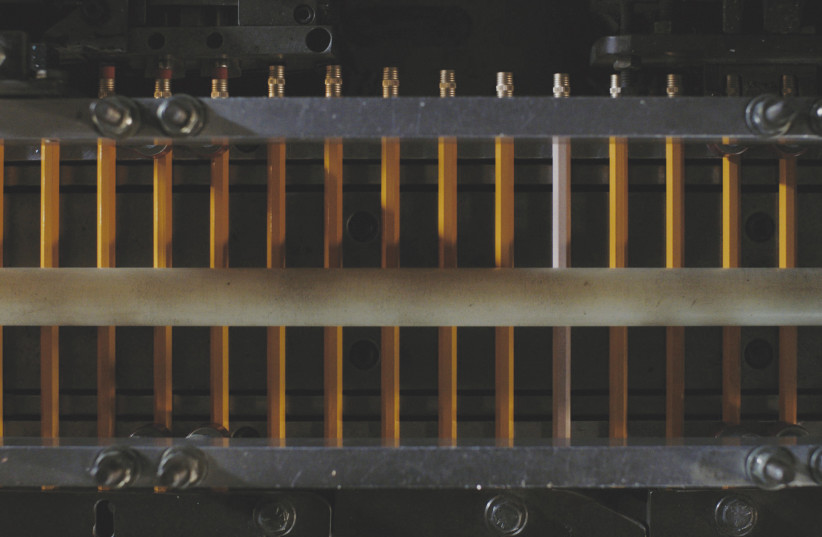
WEDNESDAY, JANUARY 17 – Join a festive 6:30 p.m. reception at Hansen House honoring the publication of the 6th edition of Erev Rav magazine (see Art News below). Dr. Sara Benninga will discuss the 1562 painting The Triumph of Death by Pieter Bruegel the Elder at 7:30 p.m., and Yonatan Amir will discuss avant-garde European art after WWII (8 p.m.). 14 Gdalyahu Alon St. Hebrew-only event. Admission is free.
Tel Aviv
Spectrum of Lights is a group exhibition that offers 60% of its sales to rebuild Be’eri Gallery after the October 7 Hamas attack on Israel. The 25 artists included, among them Adi Nes and Matan Ben Cnaan, will be offered the remaining 40%.
Founded by Orit Sabirsky in 1986, Be’eri Gallery was utterly destroyed. Sabirsky was tragically murdered in the attack. A work titled Winding Road by the gallery’s current chief curator, Ziva Jelin, is now on display at the Israel Museum, Jerusalem.
Be’eri Gallery co-curator, Sofie Berzon MacKie, stated that while the gallery was re-established at Beit Romano, Tel Aviv, “The gallery will return home to the Negev.”
The rebuilding is expected to take until 2026 and is done thanks to German support. German President Frank-Walter Steinmeier publicly stated that Germany will donate seven million euros for this purpose.
Nassima Landau Art Foundation, 55 Ehad Haam St. Shown until Thursday, February 15. Visit spectrumoflights.com to make a bid for the artworks or email the gallery directly at info@nassimalandau.com to learn more.
I, Pencil – Visit Ben Hagari’s first solo exhibition at Gordon Gallery and see the same-titled video art and a selection of light boxes and photographs based on its theme.

The title refers to the 1958 essay by Leonard Read. In it, Read described the complex operations behind the creation of a single pencil from the perspective of the writing instrument.
Largely lauded as a staunch supporter of the capitalistic free market economy, Read offered his reader to “have faith that free men and women will respond to the Invisible Hand.”
The video art was shot at the last working pencil factory in the US, the Musgrave Pencil Company in Shelbyville, Tennessee.
Opening Hours are Monday to Thursday, 11 a.m. to 2 p.m.; Saturday, from 10 a.m. to 1 p.m. 5 HaZerem St.
Umm EL Fahm
Visit Between the Spheres, the first solo exhibition of painter Nirvana Assadi Dabbah at the city’s Art Gallery.
Curated by Yael Guilat, this is but one of the 10 exhibitions currently on display. Visitors should not miss I Could Only Tell by My Nose. Curated by Yifat Sarah Pearl, the group exhibition includes works by Rozan Bathish, Suhaila Abu Hadba Mounayer, Loaa Jbara, Bludan Merai, and Eram Aghbarih. It is Aghbarih’s powerful performance that links cleaning soap to childhood trauma, which deserves special note.
Chief curator Said Abu Shakra, who vowed the gallery will work hard to keep an optimistic spirit despite these difficult times, and supports any activity that may bring people together. For more details, call (04) 6315257.
Holon
SATURDAY, JANUARY 20 – Join a noon guided tour and discussion with artist Shir Raz. In her The Bison’s Behind (curated by Avital Barak), she used the shared human artistic legacy of the Lascaux and Chauvet Caves in France to create a new image of movement.
A massive tourist attraction, the French authorities have created a copy of the original Chauvet Caves in Caverne du Pont-d’Arc. The idea being people will see the facsimile and not expose the original prehistoric art to light and heat. Created by the studio Arc et Os, the effort cost $62.5 million.
Raz used AI to create a moving experience of the 10,000-year-old images. Barak will be present as well to answer questions.
Continue the tour with Hearsay, a group exhibition with works by Nimrod Gershoni, Ira Shalit, Tomer Laham, David Lemoin, Daniel Meir, Shahar Mizrahi, Nuni Weisz, Ana Wild, and Shahar Yahalom.
In the tour, patrons will experience Rain Machine #6 by Lemoin and Leviathan by Laham, one a sound work about the soothing power of water and the other a textile-made fake skin of the sea-beast, among other works.
Curators Leila Rose Bari and Udi Edelman will lead that tour and answer inquires.
Admission is free. 4 Hamoraim St., shown until Saturday, March 16. For more information, call (03) 5568792.
Art news
EREV RAV – Titled The Mixed Multitudes, the Hebrew-language art magazine devoted its first edition of this year to discussing some key exhibitions in the short history of Israeli art. From the emergence of Conceptual Art with the ground-breaking 1971 exhibition Concepts + Information curated by the late Yona Fischer at the Israel Museum, Jerusalem to the 2,000’s Videostoria series of exhibitions at the Haifa Museum of Art curated by Ilana Tenenbaum.
Coupled with a course on the same theme offered by the Institute for Israeli Art, the publication is a remarkable achievement.
As noted in its forward, major museums here were not in the habit of documenting exhibitions as a whole, which makes their historical studies difficult. Likewise, rapid changes in technology meant that without the restoration efforts that Tenenbaum made, much of early local video art would be destroyed. As the word video is derived from the Latin videre (to see), the loss would carry a double ironic punch: loss of visual history and loss of ways to see the world.
The collected articles bring to light many names and works worthy of our attention today. Like the artist Dov Or-Ner and his 1979 work Peace Cage, in which he locked himself in a steel cage at the intersection of Dizengoff and Gordon streets in Tel Aviv, mimicking how, as he saw it, the government was preventing peace from breaking out.
It was deeply rewarding to see a mention of art writer and curator Miriam Tal. Born in 1910, Tal was the oldest living art critic in the country at the time discussed (1980). She curated the first solo exhibition of Pinchas Burstein in 1950.
Better known as Maryan, a wonderful exhibition of his works titled My Name is Maryan was shown just last year at the Tel Aviv Museum of Art under curators Alison M. Gingeras and Noa Rosenberg. This is but one thread showing how, across more than a century, art lovers in this land are in deep communication. The late Jerusalem Post art critic Meir Ronnen also gets an appreciative nod.
I especially enjoyed Hila Cohen-Schneiderman’s description of the late art writer and curator Sarah Breitberg-Semel. “I have never seen a person looking at art in this way,” Cohen-Schneiderman wrote of her. “It was a total act of seeing; her total self became seeing... I felt there is a certain tribe which has such relations with art, and she leads it.”
Unlike Ronen, late art critic Adam Baruch – responsible for talking Doron Sabag into starting an art collection, now seen as one of the finest in the country, and curating Motti Mizrachi when he represented this country in the 1988 Venice Biennale – was dealt with in very harsh terms over his aggressive style.
Baruch haughtily claimed he does not even need to visit the exhibition discussed to know what’s in it. Yet, in such a well-composed collection of reviews, this assault on the now-dead and mute writer rang like a false note. Sic transit gloria mundi.
For more, and a copy of the publication, email erevravmail@gmail.com.
Art Roundup is a monthly glance at some of the finest art exhibitions and events currently shown across the country. Artists, curators, and collectors are welcome to send pitches to hagay_hacohen@yahoo.com with “Art Roundup” in the email subject.
